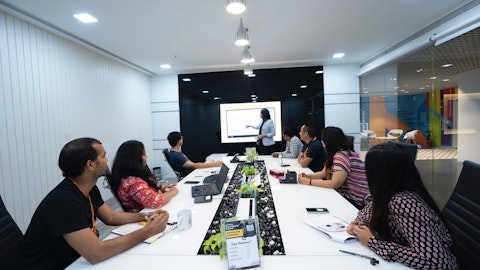Without growing the electronics side of the – just one more part. Without growing the electronics side of the business, what really differentiates Winland from Consensus right now beyond the former being publicly traded.
Murray Stahl: Okay. Well, through – the business of electronics isn’t growing, but then again, to make it grow you have to inject a lot of capital and the return on capital in electronic business is not going to be as good as return on capital in crypto. So we’re not dismantling the electronics business. It’s fine. It’s profitable, just leave it alone and it will do whatever it’s going to do. In terms of the crypto business, FRMO has participated in many equity offerings, in Winland, and we have more enough capital in FRMO to provide for all of Winland’s needs, so big difference between FRMO and Winland and Consensus is, in Winland, we raised money in really small stages and as we need it, and that money has largely come from FRMO.
In Consensus, we actually did a private offering and raised a lot of money. We probably raised more money than we really need at the time. So at the moment, we have, maybe you could argue we have excess capital. I don’t think we have excess capital in Winland. I think we have adequate capital, what we want to do, but we want to grow it. And I think you get a pretty high return on capital. As you can see, so what we have to do is look at what happened to Winland’s stock over the years since FRMO started investing in it. And now it’s a meaningful position and we’re going to hope, we can’t guarantee. We hope to be able to grow it even more, and we’ll see it happens. But you’re right. I mean they’re basically both cryptomining businesses. And at the end of the day, you’re finding the same gradual policy measured purchases of the state-of-the-art equipment.
That’s what we’ve been doing lately.
Therese Byars: What are management’s thoughts on GBTC and other Bitcoin ETF lack of in-kind reduction options and allowing only the SEC’s cash-only creation/redemption policies?
Murray Stahl: Well, I mean, I can’t speak for them. I could see why they don’t want in-kind redemptions. But at the end of the day, when you’re an ETF, people don’t have to leave money in the fund. So there’s a lot of ways to – let’s just say there are a lot of ways to do the equivalent of in-kind redemption if you really want to do it. And I’ll just leave it at that rather than state what the possibility is – there are a lot of possibilities that are open. And the time will tell what people are going to do. So I’m sure you’ll see some interesting things in the next couple of months.
Therese Byars: Last question, without revealing anything that may reduce Horizon or FRMO’s competitiveness, what is the process by which ideas are generated at Horizon Kinetics and FRMO, for example, how does an idea come to the attention of Mr. Stahl and Mr. Bregman, and how is it determined of which, if any, Horizon product to incorporate that idea into, for example, determining to use FRMO versus the Paradigm Fund versus the Rent Fund or some other vehicle to invest in an idea.
Murray Stahl: Okay. Well, any way can generate ideas and rare though it may be even I have an idea from time to time. And the portfolio manager in question is at liberty to incorporate an idea, assuming it falls within the scope of the charter of the fund that the person is managing. So some of the funds are more general and you have a greater liberty of action to those funds and then there’s the corporations. And it’s basically in the corporations like Winland or FRMO or Horizon Kinetics, so for corporate capital, it’s Steve and myself. They’re the allocators. So we make the decisions.
Therese Byars: Okay. Murray, Steve, that was our last question. So do you have any closing remarks?
Murray Stahl: Only to say I enjoyed getting the questions. I enjoyed answering the questions. Is there anything that we didn’t cover or an answer to question if I was a little opaque and maybe I shouldn’t have been opaque or would you didn’t get to cover something that you’re interested in? Please don’t hesitate to contact us, and we’ll get you an answer. And of course, we’re going to reprise this in about 90 days and thanks so much for your support and for a lively discussion. And we’re going to see again real soon. So thanks so much, and I guess, I’ll sign off now.
Therese Byars: Okay. This ends our conference call. You may now disconnect. Thank you for joining us.
Follow Frmo Corp (OTC:FRMO)
Follow Frmo Corp (OTC:FRMO)
Receive real-time insider trading and news alerts





